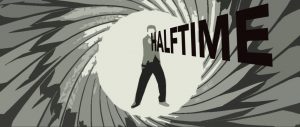Best Picture by Adora Adeyemi and Maanasi Chintamani
Prediction: Oppenheimer
Should Win: Oppenheimer
Despite the lingering impacts of the pandemic and a monthslong writers and actors strike, 2023 saw the release of an exceptional crop of films, and the contenders for Best Picture encompass much of this excellence. The nominations feature a mix of predictable picks (Killers of the Flower Moon, Maestro), pleasant surprises (Past Lives, Zone of Interest, Anatomy of a Fall), and even a handful of comedies (American Fiction, Poor Things, The Holdovers). But no account of this year in film would be complete without acknowledging the sensation that was Barbenheimer, the blockbuster duo that dominated both the summer box office and social media discourse.
Given its contribution to the phenomenon—largely by merit of its unparalleled quality—one nominee stands above the rest: Oppenheimer, Christopher Nolan’s ambitious portrayal of the inventor of the atomic bomb. The film is technically superb with Ludwig Göransson’s immersive and inventive score; cinematography that captures the grandeur of sweeping vistas and the intimacy of characters’ interiority alike; and masterful special effects that evoke both the thrill of scientific discovery and the chilling reality of weapons of mass destruction. Cillian Murphy delivers a particularly haunting portrayal of the titular role, and is supported by phenomenal performances from the entire cast. Despite a lengthy three-hour runtime, the film flies by with its gripping, fast-paced storytelling and well-executed dual timeline—allowing the film to dodge the pitfall of the uniformly glowing biopic by demanding that audiences grapple with its protagonist’s complex legacy.
Given the overwhelming praise the film has received from audiences, critics, and now evidently from within the industry itself, it is all but guaranteed that Oppenheimer will take home the night’s most coveted prize. Dominating this awards season with a host of nominations and subsequent wins, the film shows no signs of losing momentum. As we march closer to the end of the circuit, these victories hold increasingly more weight. In the past month alone, it has been awarded Best Film by the British Academy, the Screen Actors Guild, the Directors Guild, and the Producers Guild—organizations whose voting patterns have proven to be strong signifiers of which way the Oscars will sway. As if that weren’t enough, Oppenheimer is already leading the Oscars race with a whopping 13 nominations, making it one of the most nominated films in the institution’s history. Without waxing lyrical any further, it’s safe to assume the Academy is inscribing the film’s name on the golden statuette as we speak. All signs point to an expected (but still explosive) win.
Best Actress by Tina Solki
Will Win: Lily Gladstone, Killers of the Flower Moon
Should Win: Lily Gladstone, Killers of the Flower Moon
A strong year in film is almost always carried by a year of phenomenal performances, and come March, voters face the daunting task of crowning the most exceptional female lead for Best Actress. This year, that outstanding strength is found—subdued, humming, ingrained—in Lily Gladstone’s performance as Mollie Burkhart in Killers of the Flower Moon.
Gladstone anchors Killers. Her performance is leaden—the haunting behind her eyes is indelible, permeating the film even when she’s offscreen. A lesser actress would wilt under the pressure of the role, but Gladstone moves mountains with every wayward glance. Gladstone has mastered the power of restraint: her ability to express fervent emotions in small details helps her eclipse the dynamic and inventive performances of her counterparts.
Gladstone’s most pressing competition is Emma Stone, who plays Bella Baxter in Poor Things, a woman with the brain of a child rapidly clambering into maturity. Stone’s performance is equal parts electric and eclectic. She deftly captures the awkward physicality of Bella’s brazen exploration of her body, while simultaneously bringing a sense of candor and clarity to the role that keeps the film grounded. It’s a performance the likes of which has not been seen before and will not be seen again for some time—and one I would not be upset to see take home the Oscar. However, Gladstone remains the more probable winner, especially as corroborated by precursor awards.
Both Stone and Gladstone have taken home a Golden Globe in their respective genres. However, Stone won at the Critics’ Choice Awards and the BAFTAs, where critics cast doubt on the validity of Gladstone’s performance as that of a lead, given her relative lack of screentime. Her low on-screen visibility has been Killers’ most persistent criticism: besides its titanic 226-minute runtime, the film has garnered criticism for a perceived decentering of Mollie within the narrative. Within the context of awards contention, however, Gladstone’s lack of screen time makes the magnitude of her impact on Killers even more impressive: Gladstone is undeniably the heart of the film. Her ability to embody the excruciating tragedy inflicted upon Mollie by agents of colonial greed forms the bedrock of Killers.
It was not until the Screen Actors Guild Awards—the final, and typically most significant precursor to the Academy Awards—that Gladstone visibly began to regain her momentum. When accepting the award for Best Female Actor in a Leading Role, Gladstone delivered a touching speech on the role of visibility in bringing historically marginalized groups “out of the shadows,” remarking upon the power of performance to humanize one group in the eyes of another.
To this end, the popular desire for Burkhart to have a greater role within the narrative is, in large part, induced by the humanist approach Gladstone took to her performance. Mollie is real to the audience. The tragedy of her life is rendered in such exhaustive detail that the passivity and helplessness that entraps her is projected directly upon the viewer. It invokes a bone-deep discomfort that is, ultimately, the explicit goal of the film; there is no Killers without Gladstone.
All of this is to say, come Sunday night, expect Gladstone to leave the Highland Centre with the Oscar for Best Actress, and for the culture to finally take a step forward in the recognition of authentic representation of indigenous groups in film.
Sound by Andrew Arnold
Will Win: Oppenheimer
Should Win: The Zone of Interest
The presumptive favorite in nearly all 13 (!!!) categories it’s nominated for, Oppenheimer (2023) is expected to win big this year. While well acclaimed for its scriptwriting and cinematography, sound is one vital, overlooked contributor to the success of this blockbuster biopic. Nolan worked closely with Oscar-winning sound designer Richard King to create an aural experience that imbues a sense of unease for the audience and, most notably, mimics that of the Trinity explosion to a tee. Nolan’s love for the practical over the artificial extends to sound, as most of the film’s sound effects were captured live on set rather than reproduced in the studio. The director’s boldness shines through in the film’s audaciously loud soundscape, but Oppenheimer does falter at points and relies too heavily on this loudness to the point where it becomes distracting—almost as if the epic insists that you should take it seriously rather than letting its story do the metaphorical talking. A filmmaker with the craft and creativity of Nolan should trust his skill, and not have to spoon-feed his audience with over-the-top sound effects. Still, there’s no doubt that Oppenheimer’s sound design would be the best in class in most years. In particular, the scene in which Oppenheimer (Cillian Murphy) delivers a speech to his colleagues about the successful dropping of the bomb on Hiroshima is a masterful work of art. The high-pitched shrill in Oppenheimer’s mind is contrasted with the obscenely loud clapping, yelling, and stomping, showing the dichotomy between the animalistic applause of the crowd and Oppenheimer’s internal guilt—the alternating focus between these two soundscapes produces a deeply chilling scene.
The other major player for Sound is Jonathan Glazer’s The Zone of Interest (2023), which depicts the family of a Nazi commandant living just outside Auschwitz Concentration Camp. As is evident by its premise, The Zone of Interest is a horror story depicting the evils of Nazism, but the film evokes this horror not in what it shows, but in what it omits. Glazer explicitly does not display any of the atrocities that occurred in the camp; instead, he lets the background noise convey all the wickedness. The muffled gunshots and screams, the low hum of the incinerator, and the rhythmic chug of the train all become white noise to the Höss family. These sounds were impossible to forget for the viewer, but easy to ignore for the Höss’. Every decision about the soundscape was deliberately chosen by Glazer and sound designer Johnnie Burn (The Favorite, Waves) to feel just out of reach of the audience—existing on the periphery of the seemingly normal events unfolding on screen and perfectly complementing the film’s theme of the banality of evil. Glazer concludes The Zone of Interest with a minute of a black screen accompanied by a haunting incantation to let the audience sit in silence—not in response to the horrors they just saw, but because of the horrors they just heard.
Music (Original Score) by Andrew Arnold
Will Win: Oppenheimer
Should Win: Poor Things
With a BAFTA and a Golden Globe already under his belt this awards season, Swedish super-composer Ludwig Göransson is nearly guaranteed his second Academy Award (following Black Panther, 2018) when Oppenheimer (2023) wins Best Original Score in March. The main motif in Oppenheimer uses a lush string instrumentation accompanied by harps and a piano. As Nolan explains in an interview, the use of the violin conveys the high-strung nature of Oppenheimer’s internal conflicts through high-pitched strings. This motif is generously reincorporated throughout the film in growing intensity, as Göransson sprinkles in more bass and metallic sounds as the movie inches closer and closer to the completion of the Trinity atomic bomb. Göransson’s work is a stunning work of art, with the main theme, “Can You Hear The Music,” being a masterclass in songwriting. Although the technical craft of the score cannot be understated, Nolan was very liberal in using the score to convey emotions and themes, almost to its detriment. Given how gorgeous and powerful the main motif is, its overuse strips away a lot of its impact and drowns out the larger story being told.
While Oppenheimer is most certainly the odds-on favorite in Original Score, Poor Things (2023) scored by Jerskin Fendrix (his first time scoring a feature-length film!) deserves equal acclaim. The main motif for Bella features short, plucky harp strings with a dissonant twang reminiscent of a slide guitar. Chords of this almost-drunk sound repeat in a number of scenes that depict Bella’s curiosity, adding underlying depth to the character in a discreet yet effective manner. As a reanimated Frankenstein-like character, Bella stumbles around throughout the movie but maintains a sense of whimsical, mischievous innocence to her. Her childlike wonder and naivety are central to the film’s themes, an innocence that the music captures perfectly. As Bella continues to mature and learn about the darker aspects of the world, Fendrix’s score switches to high-pitched, pulsating strings accompanied by metronomic pipe organs that heighten the suspense, all while maintaining Poor Things’ strange, fantastical sound. Similar to Oppenheimer, Poor Things doesn’t shy away from making its score a prominent aspect of its storytelling, but Lanthimos allows room for his characters to breathe without having the score overwhelm the on-screen performances. Although Poor Things likely won’t get the win for Best Original Score, Jerskin Fendrix has certainly cemented himself as a prominent up-and-coming composer.
Best Original Screenplay by Isabel Shepherd
Will Win: Anatomy of a Fall
Should Win: Anatomy of a Fall
If the Golden Globes, BAFTAs, and César Awards are any indication, Anatomy of a Fall (2023) has strong odds of taking home the win. The New York Films Critic Circle and National Society of Film Critics favored May December (2023), but the film’s subpar performance at the Globes casts doubts on its strength against the almost universally acclaimed juggernaut Anatomy. Both May December and Anatomy expertly interrogate the vast, slippery space between what we say and what we mean—while this ambiguity is brought to life by the incredibly strong casts in both films, the work of the screenplays should not be discounted. The pressures of language are uniquely important to the story of Anatomy, as Sandra (Sandra Hüller) struggles to defend herself in a French court in a language that she speaks competently, but not confidently. Throughout the film, Sandra, in both French and the “middle ground” of English, tries fiercely to make her experience seem crystal-clear to the court. Still, writers Justine Triet and Arthur Hararithe maintain a degree of uncertainty about Sandra’s motives that makes Anatomy deeply compelling—after all, the consequences of taking her at her word are life and death. Fueled by powerful equivocality, Anatomy manages to hold on to all of its nuances without ever compromising its vision.




